GPS trackers have been fitted to a herd of sheep in the Mournes by the National Trust to monitor the land's recovery following the wildfire in April.
Data from the trackers will be used to determine whether the animals are spending long periods grazing the new growth as it emerges in the burnt areas.
The wildfire destroyed around 200 hectares of National Trust land and Slieve Donard was among the areas worst hit.
The collars cost £3,000 and have been funded by the National Trust’s Farming Innovation Fund.
They will send an alert every 15 minutes to the farmer about the animal's activity levels and even their temperature.
The sheep will wear the collars until they come back down to lower ground in the autumn.
The charity will also use drone imagery, habitat monitoring and control sites to provide data on any impact of grazing and allow the land to be managed for a return to full health.
According to the conservation charity, there are already positives signs of recovery including new heather growth and returning wildlife.
Rhona Irvine, Rural Surveyor for the National Trust, explained how problems controlling livestock on Slieve Donard allowed them to come up with this solution.
"We are fitting ergonomic GPS tracking collars on a proportion of the flock which will be regularly recording the position of the animals.
“Our aim is to ensure the mountain gets back to full health as soon as possible for the animals and invertebrates that live there, but also for the many people who love, care for and visit this special place.”
Slieve Donard is Northern Ireland’s highest mountain and a site that’s designated as a Special Area of Conservation due to the montane and dry heath, blanket bog and specialised species which thrive there.
Northern Ireland Environment Agency (NIEA) and the Mourne Heritage Trust are also working on this project.
Farmer John Maginn believes the new technology will help with habitat management, as well as animal welfare.
“Our family has been farming in the mountains for many years and it’s great to see money being spent on technology that will make our job easier and more efficient, though we will always continue to rely on the sheepdogs to do what they do best,” he said.









